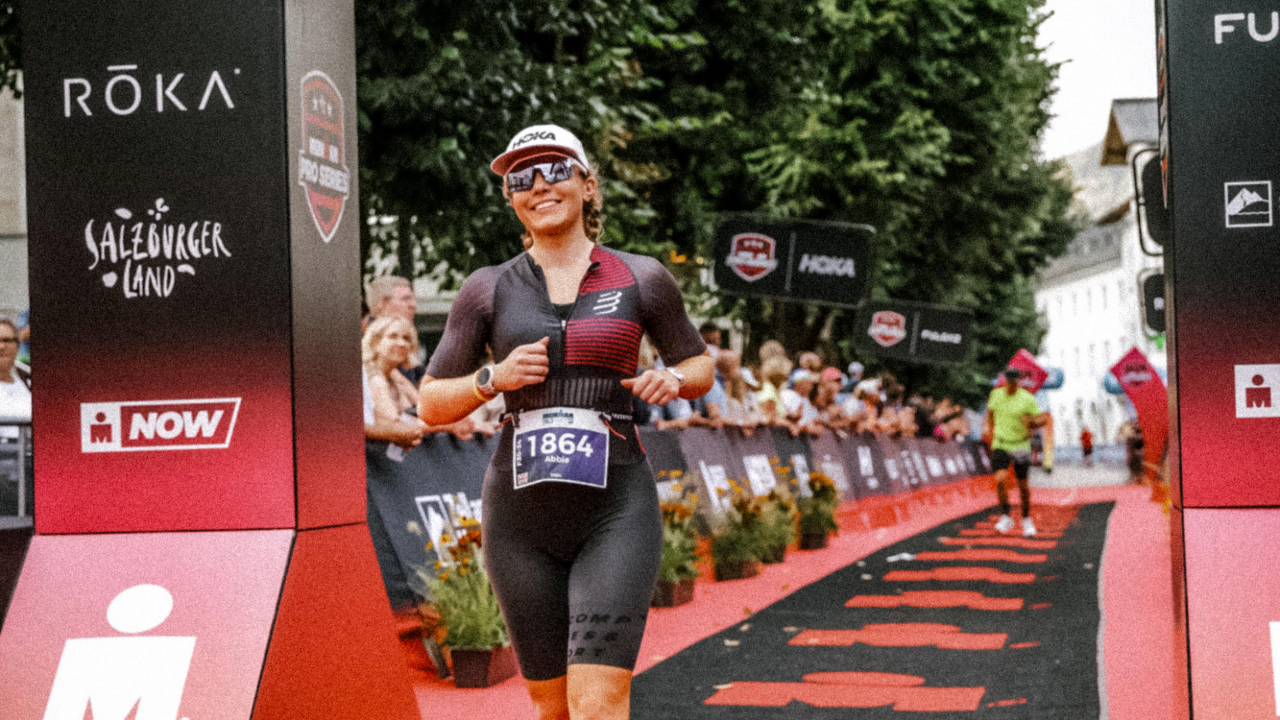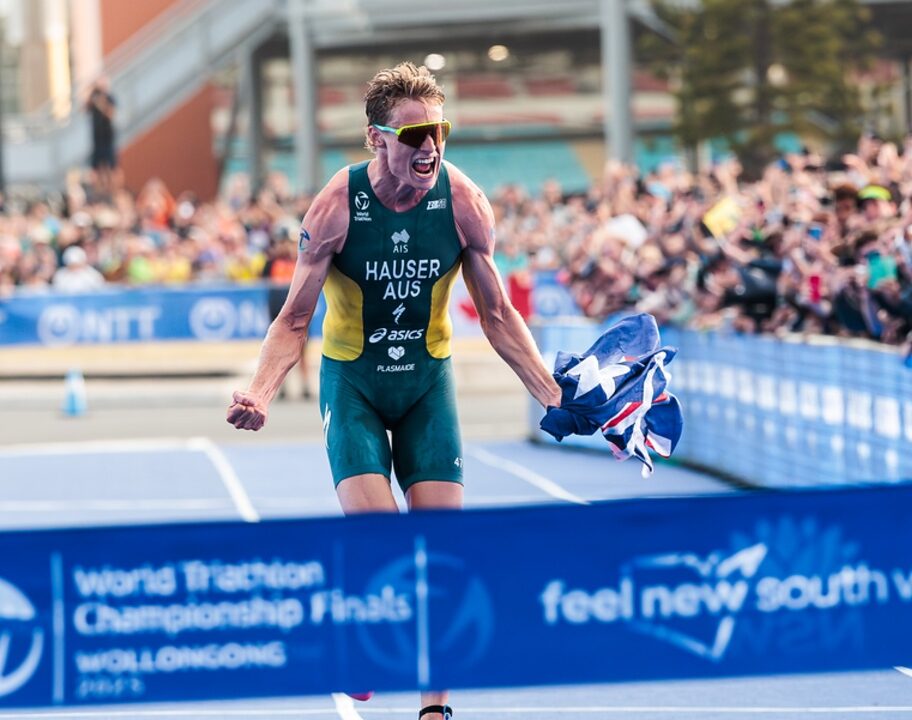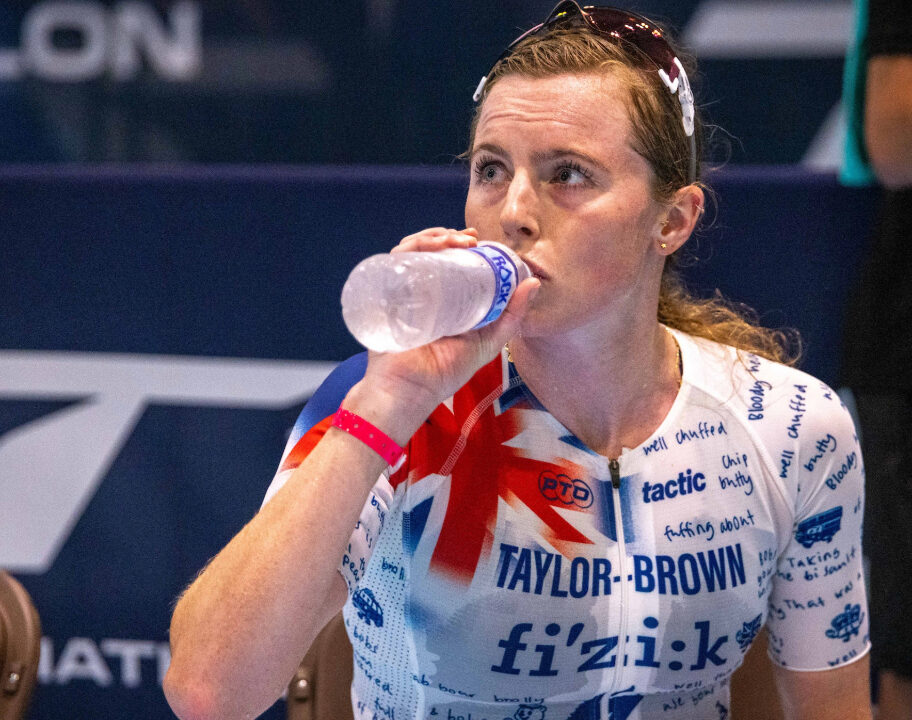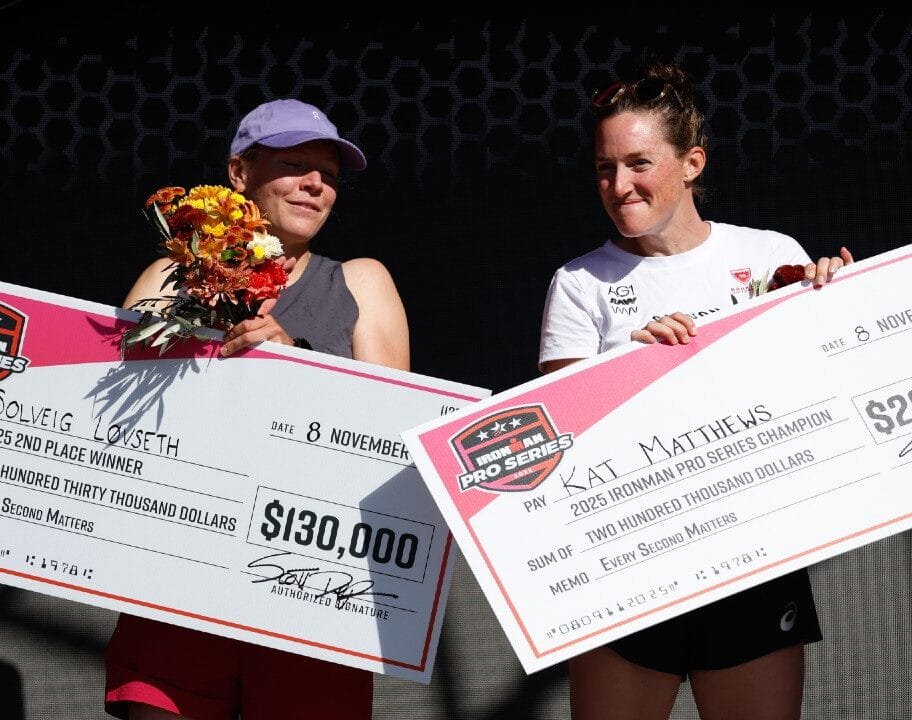For most new triathletes, a small, local sprint distance race is usually the starting point to dip their toe into the world of multisport before stepping up to the longer distances. But for Abbie Brind, that journey to the start line of her first middle distance triathlon was set to be fast-tracked. She won a competition for an entry to IRONMAN 70.3 Zell am See, just 14 weeks before the race.
Having only 14 weeks to prepare for a half distance triathlon would be a tall order for anyone. So you can imagine that Abbie was well and truly throwing herself in at the deep end when her to do list involved ‘learn how to swim’ and ‘get a bike’.
Having gone from complete beginner to half Ironman finisher in a little over 3 months, Abbie has caught the triathlon bug and is set to take on more swim-bike-run in 2025 as part of Team Outlaw. Whether you’re already set to race your first half Ironman this year – or you’re hesitating over that ‘enter now’ button. Read on to find out why Abbie believes “you can literally do anything you set your mind to”, and to get her top tips for taking on your first middle distance triathlon.
Five things I learned from my first half Ironman
Getting ready to take on your first middle distance triathlon (1.9km swim / 90km bike / 21.1km run) can feel daunting. Get Abbie’s insights on what taking on the distance was really like, after she made a quick transition from total beginner to half Ironman finisher.

1. You’re not the only beginner
When you’re new to a sport, it can be easy to feel like every other person is a seasoned PRO who knows exactly what they’re doing. But in reality, that’s far from the case. “I imagined I would be [the only beginner],” says Abbie. “But to my surprise, I was overtaking grown men swimming breaststroke in the water.”
“People were so friendly on race day, I made friends with a local group as we waited to get in the water, they were beginners too and it was their first half Ironman. They were equally apprehensive about the swim which made me feel so much better on the start line. You’re all in it together, the swim is just survival mode!”
2. Most people aren’t competing ‘against’ you
For many would-be triathletes, the thought of an ultra-competitive field and a hostile race day atmosphere can be off putting. However, as most age-groupers will vouch for – it’s actually a much more welcoming and inclusive environment than you might think. “Unless you’re a pro or a top age-group athlete, most people are just competing against themselves,” Abbie explains.
“It’s beautiful to see people of all ages, genders and ethnicities from all over the world take on such a big challenge for their own personal reasons.”
Don’t let the fear of an intimidating or competitive environment put you off giving a longer distance triathlon a go – a half Ironman might sound terribly serious. But even at the pointy end of the field, most people ultimately just want to find out what they’re capable of.
3.You’re supported all the way through
Triathlon might be a solo sport, but that doesn’t mean you’re on your own come race day. “The support was amazing and I was smiling (almost) the whole time,” Abbie reflects. “Other athletes will help you and cheer you on, as will all the locals and spectators, and the volunteers at the aid stations.”
There’s a strong sense of community in triathlon, so you can rest assured that whether you’re heading to a race with a full squad of friend/family cheerleaders in tow, or arriving solo. You’ll get plenty of support from start to finish.
4. Don’t wait until you’re ready, you learn the most when you throw yourself in the deep end.
Pulling the trigger on that ‘enter now’ button for your first half Ironman distance triathlon can be scary. But if you keep putting it off until you’re ‘ready’ – you’ll probably never do it. Because the reality is, none of us knew for sure we’d be able to finish our first 70.3 before we went and tried it – that’s all part of the journey. Tasking yourself with a big challenge and finding out what you’re capable of. Sometimes you need to take a leap and trust that you’ll work it out along the way. Entering the race will give you a deadline, and it’ll force you to focus on getting yourself ready for the start line.
“Where there’s a will, there’s a way!” Abbie says. “You can literally do anything you set your mind to.”
“I won the ticket with 14 weeks to learn how to swim, buy a road bike and dramatically improve my running fitness and endurance.”
“I’d only ever run one half marathon before, and that was 3 years prior. Don’t wait until you’re ready, you learn the most when you throw yourself in the deep end.”
5. Get a coach
Knowing how to train for a half Ironman and balance all the training with work and life can be a bit overwhelming. And while it’s perfectly possible to plan your training yourself – there’s plenty of training tips and resources out there. If you can get a coach, having someone to guide you through the process and manage your training load effectively can make a big difference to your confidence levels.
“[Getting a coach] was the best decision I made,” explains Abbie. “it gave me an invaluable sense of calm confidence on race day, helped me manage my training load, gave me accountability during training, took all the mental stress out of planning sessions and made it that little bit easier to show up when motivation is lacking.”
If 1-1 triathlon coaching isn’t feasible, it’s worth looking for an online training plan to give you some structure. And joining your local triathlon club where you’ll have a hive mind of triathlon knowledge to call upon.
Tips for taking on your first half Ironman distance triathlon – a beginner’s words of wisdom
Hopefully Abbie’s story has convinced you to take the plunge and enter your first half Ironman distance race, if you haven’t already. There’s plenty of triathlon training tips available to help you on your way to the start line. But based on her own experience of going from complete beginner to 70.3 finisher, we asked Abbie for her 3 top tips for taking on a middle distance triathlon.
Incorporate race pace ‘brick’ workouts into your training
Of course you’ve got to build up your strength and endurance in the three individual triathlon disciplines. But it’s important as you get closer to race day to practice putting them together. Brick workouts (stacking two of the sports together, for example running straight after cycling) are a good way to get used to this. Start off completing two of the sports back to back at an easy pace to get used to the sensation. And then start injecting some pace so you get used to doing it at race intensity.
“Practice running out of the water and running off the bike after HARD efforts,” Abbie recommends. “I did lots of brick workouts but nothing prepared me for the feeling on race day after pushing hard on the bike. The run was not fun!”
You don’t want to do too many high intensity brick sessions in training – otherwise you risk injury/burnout. But a few sessions riding at your target race pace and running afterwards will help you to understand how hard you can push on the bike, without impacting your run. And it’ll help to prepare you for how it’s going to feel on race day.
Planning and organising can help to calm any pre-race nerves
The days leading up to your first big triathlon event can feel overwhelming. Between getting all your kit ready, going through athlete registration and bike racking, and setting up your transition zone – the logistics alone are enough to set your mind whirling, let alone the matter of taking on the race itself.
To avoid feeling overwhelmed, which will only heighten your nerves, Abbie recommends taking the time to plan and go over all the details. “Spend time revising and visualising everything! Your nutrition plan and timings, maps of start and finish locations, kit list, transition bags and the race guide. Knowing this inside out is the best way to calm pre-race nerves when it all feels overwhelming.”
By focusing on the practical details, and controlling the controllables – like sticking to your nutrition plan and making sure you have plenty of time on race morning. You’ll have something to keep your mind occupied instead of dwelling on the nerves, and you’ll set yourself up for a stress free start to your race.
Don’t forget to enjoy the experience
It’s easy to get swept up in all the nerves, perceived pressure and ‘what ifs’ during any triathlon. But remember, you’ll only get to experience your first ever half distance triathlon once – so enjoy it!
“Seriously, just enjoy the experience. Relax and smile! You worked so hard to get here, tell yourself you’ll be fine. There is nothing more you can do. And the feeling of cycling on closed A-roads is unbeatable.”
Inspired to ‘tri’ a middle distance triathlon? Check out our round up of the best middle distance races for first timers and get a race booked – it’s time to put a date on achieving your goal!













